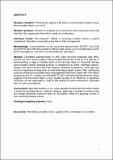| dc.contributor.author | Diver, Sean | |
| dc.contributor.author | Avalos, Gloria | |
| dc.contributor.author | Rogers, Eamonn T. | |
| dc.contributor.author | Dowling, Maura | |
| dc.date.accessioned | 2018-12-07T09:15:50Z | |
| dc.date.issued | 2017-12-10 | |
| dc.identifier.citation | Diver, Sean, Avalos, Gloria, Rogers, Eamonn T, & Dowling, Maura. (2018). The long-term quality of life and information needs of prostate cancer survivors. International Journal of Urological Nursing, 12(1), 16-26. doi: doi:10.1111/ijun.12156 | en_IE |
| dc.identifier.issn | 1749-771X | |
| dc.identifier.uri | http://hdl.handle.net/10379/14671 | |
| dc.description.abstract | What are the quality of life (QoL) and information needs of long‐term prostate cancer survivors? Numbers of prostate cancer survivors are increasing and it is vital that their QoL issues and information needs are understood. The long‐term effects of surviving prostate cancer is poorly understood. Specialist nurses play a key role in their management. A cross‐sectional survey was used. The study questionnaire [(European Organization for Research and Treatment of Cancer‐Quality of Life Questionnaire) EORTC‐QLQ‐30 and EORTC QOL‐INFO25] was posted to 398 prostate cancer survivors attending an Irish centre managed by a clinical nurse specialist and consultant. Completed questionnaires (n = 195) were returned (response rate 49%). Overall, the men demonstrated a Global Health Status/QoL score of 77·6 (SD 20·7), demonstrating a high or healthy level of functioning. Men on hormonal therapy demonstrated inferior physical function in comparison to other treatment options. Fatigue and insomnia were the most frequent symptom experienced, while age was the most significant demographic variable affecting symptom scales. Men undergoing active surveillance for prostate cancer management were least happy with information received (p = 0·019). Comparison with EORTC QLQ‐C30 international reference values suggests that this cohort report a high/healthy QoL. However, a significant proportion of men expressed a need for the receipt of further information, especially men on active surveillance. Specialist nurses are in a unique position to meet the information needs of long‐term prostate cancer patients. However, planning is needed to ensure there are enough specialist nurses to meet the information needs of a growing number of men surviving prostate cancer. | en_IE |
| dc.format | application/pdf | en_IE |
| dc.language.iso | en | en_IE |
| dc.publisher | Wiley | en_IE |
| dc.relation.ispartof | International Journal of Urological Nursing | en |
| dc.rights | Attribution-NonCommercial-NoDerivs 3.0 Ireland | |
| dc.rights.uri | https://creativecommons.org/licenses/by-nc-nd/3.0/ie/ | |
| dc.subject | Information | en_IE |
| dc.subject | Prostate cancer | en_IE |
| dc.subject | Quality of life | en_IE |
| dc.subject | Survivorship | en_IE |
| dc.title | The long-term quality of life and information needs of prostate cancer survivors. | en_IE |
| dc.type | Article | en_IE |
| dc.date.updated | 2018-12-03T20:58:13Z | |
| dc.identifier.doi | 10.1111/ijun.12156 | |
| dc.local.publisherstatement | https://doi.org/10.1111/ijun.12156 | en_IE |
| dc.description.peer-reviewed | peer-reviewed | |
| dc.description.embargo | 2018-12-10 | |
| dc.internal.rssid | 13338100 | |
| dc.local.contact | Maura Dowling, School Of Nursing And Midwifery, Room 415 Aras Moyola, Newcastle Road, Galway. 3833 Email: maura.dowling@nuigalway.ie | |
| dc.local.copyrightchecked | Yes | |
| dc.local.version | ACCEPTED | |
| nui.item.downloads | 308 | |


